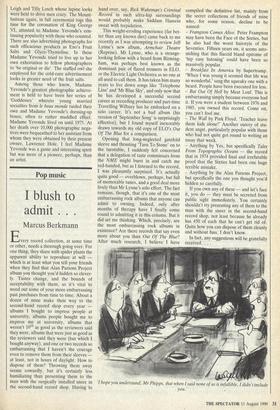Pop music
I blush to admit . . .
Marcus Berkmann
Every record collection, at some time or other, needs a thorough going over. For one thing, they share with spider plants the apparent ability to reproduce at will which is at least what you tell your friends when they find that Alan Parsons Project album you thought you'd hidden so clever- ly. Tastes change, and the bounds of acceptability with them, so it's vital to weed out some of your more embarrassing past purchases from time to time. About a dozen of mine make their way to the second-hand record shop every year albums I bought to impress people at university, albums people bought me to impress me at university, albums that weren't 1018 as good as the reviewers said they were, albums that were just as good as the reviewers said they were (but which I bought anyway), and one or two records so embarrassing that I haven't the courage even to remove them from their sleeves at least, not in hours of daylight. How to dispose of them? Throwing them away seems cowardly, but it's certainly less humiliating than presenting them to the man with the surgically installed sneer in the second-hand record shop. Having to hand over, say, Rick Wakeman's Criminal Record in such ultra-hip surroundings would probably make Saddam Hussein sweat with trepidation.
This weight-eroding experience (far bet- ter than any known diet) came back to me recently as I was attempting to review Jeff Lynne's new album, Armchair Theatre (Reprise). Mr Lynne, who is a strange- looking fellow with a beard from Birming- ham, was perhaps best known as the dominant pair of flared trousers in ELO, or the Electric Light Orchestra as no one at all used to call them. It has taken him many years to live down songs like 'Telephone Line' and `Mr Blue Sky', and only now that he has developed a successful second career as recording producer and part-time Travelling Wilbury has he embarked on a solo career. It's not a bad album (his version of 'September Song' is surprisingly effective), but I found myself inexorably drawn towards my old copy of ELO's Out Of The Blue for a comparison.
Opening that long-neglected gatefold sleeve and thrusting 'Turn To Stone' on to the turntable, I suddenly felt concerned that a delegation of taste commissars from the NME might burst in and catch me red-handed, but as I listened to the record, I was pleasantly surprised. It's actually quite good — overblown, perhaps, but full of memorable tunes, and a good deal more lively than Mr Lynne's solo effort. The fact remains, though, that it's one of the most embarrassing rock albums that anyone can admit to owning. Indeed, only after months of therapy have I finally come round to admitting it in this column. But it did set me thinking. Which, precisely, are the most embarrassing rock albums in existence? Are there records that say even more about you than Out Of The Blue? After much research, I believe I have compiled the definitive list, mainly from the secret collections of friends of mine who, for some reason, decline to be named: – Frampton Comes Alive. Peter Frampton may have been the Face of the Sixties, but he also had the worst hairstyle of the Seventies. Fifteen years on, it seems asto- nishing that this flaccid bland epitome of 'hip easy listening' could have been so massively popular.
– Breakfast In America by Supertramp. 'When I was young it seemed that life was so wonderful,' sang the squeaky one with a beard. People have been executed for less.
– Bat Out Of Hell by Meat Loaf. This is embarrassing simply because everyone had it. If you were a student between 1976 and 1985, you owned this record. Come on, you can't fool me.
– The Wall by Pink Floyd. 'Teacher leave them kids alone!' Another outcry of stu- dent angst, particularly popular with those who had not quite got round to writing an essay that week.
– Anything by Yes, but specifically Tales From Topographic Oceans — the record that in 1974 provided final and irrefutable proof that the Sixties had been one huge terrible mistake.
– Anything by the Alan Parsons Project, but specifically the one you thought you'd hidden so carefully.
If you own any of these — and let's face it, you do — they must be secreted from public sight immediately. You certainly shouldn't try presenting any of them to the man with the sneer in the second-hand record shop, not least because he already has 450 of each that he can't get rid of. Quite how you can dispose of them cleanly and without fuss, I don't know.
In fact, any suggestions will be gratefully received. . . .
'I hope you understand, Mr Phipps, that when 1 said none of us is infallible, I didn't include you.'










































 Previous page
Previous page